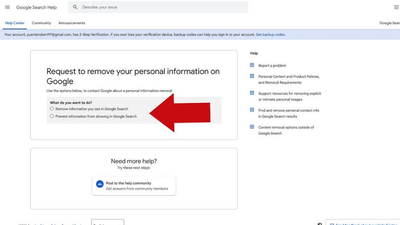
In a world where digital footprints are as real and influential as physical ones, maintaining control over your online persona is as crucial as ever. Whether you are an individual seeking privacy or a professional curating a public image, one thing is clear: Google is the heart and soul of your internet presence. After all, who doesn't turn to Google when they want to know more about someone or something?
While the internet giant has contributed significantly to the information revolution, this also means that a simple Google search can reveal more about you than you'd like.
Personal information – home address, work details, family names, credit card details, medical records, and even confidential login data – can all be found lurking on search engine result pages. Worrisome, isn't it?
Fear not, for Google has been listening. Recently, they updated their policies to enable users to request the removal of their sensitive and personally identifiable information from search results. This doesn't entirely erase your existence from the internet, but it certainly makes it more difficult for your information to fall into the wrong hands. So, let's dive into how you can manage your online presence and remove yourself from Google searches.
Access through the Google App
You can click on the link here. You can follow these steps to submit a request to remove any of your information from the web:
To further reduce your online visibility, you can deactivate your social media accounts or switch to using pseudonyms. Deleting or updating old accounts that you no longer use is also recommended.
If you still want to maintain a social media presence, set your accounts to private to limit what Google can show in search results. Remember, however, that it can take weeks for deleted content to stop showing in search results.
By setting your accounts to private, you can control who sees your content and personal information on these platforms, and this can help limit what shows up on Google searches related to your name.
Various websites, data-collection sites, and data-broker services might display your personal information. Though each site has a unique process for removal requests, getting your information deleted is possible. If this seems too overwhelming, there are removal services that can help you out.
To take pictures of your home off of Apple Maps, you will need to do so in writing and "request that a face, license plate or your own house be censored." The email address to reach them at is [email protected].
Here are some tips and best practices to keep your personal and financial information safe from cyberattacks and identity theft.
Have good antivirus software on all your devices: The best way to protect yourself from having your data breached is to have antivirus protection installed on all your devices. This can also alert you of any phishing emails or ransomware scams. See my expert review of the best antivirus protection for your Windows, Mac, Android & iOS devices.
Use identity theft protection: Identity Theft protection companies can monitor personal information like your Home title, Social Security number (SSN), phone number, and email address and alert you if it is being sold on the dark web or being used to open an account. They can also assist you in freezing your bank and credit card accounts to prevent further unauthorized use by criminals. See my tips and best picks on how to protect yourself from identity theft.
Have strong passwords and use 2-factor authentication: Using the same password across multiple platforms will always make you more vulnerable because if one account gets hacked, they all get hacked. And 2-factor authentication is just an extra shield that will prevent a hacker from getting into your accounts. Make sure to use a password manager to keep track of all your passwords. See my picks for best password managers here
Removing personal information from Google searches is a huge step toward reclaiming your privacy online. However, keep in mind that erasing your digital footprint completely is nearly impossible. What we can do is make it harder for the unwanted elements to find us. If you’re ready to make your online persona more secure, start managing your online presence today, and remember, privacy is a right, not a privilege.
What steps are you taking to ensure your online privacy? Are you comfortable with the amount of personal information about you that can be found online, or are you working to reduce your digital footprint? Let us know by commenting below. Let us know by commenting below. Let us know by writing us at Cyberguy.com/Contact
For more of my tech tips & security alerts, subscribe to my free CyberGuy Report Newsletter by heading to Cyberguy.com/Newsletter
Answers to the most asked CyberGuy questions:
Copyright 2023 CyberGuy.com. All rights reserved.